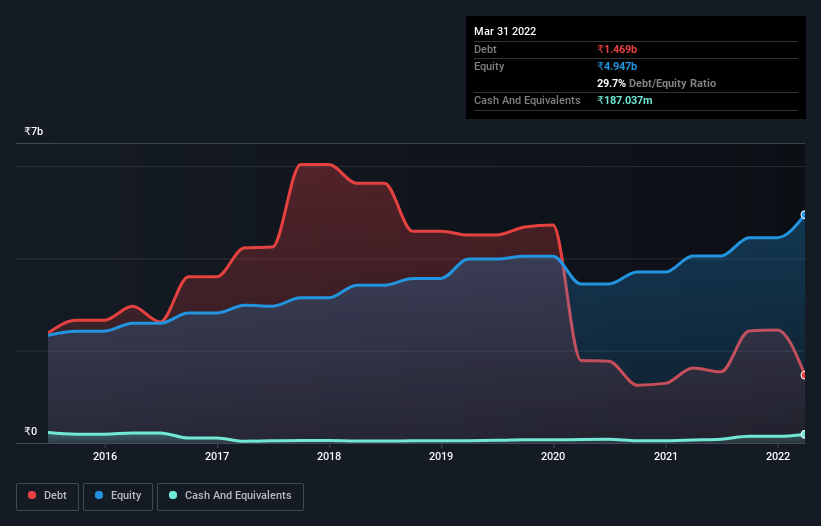Here's Why Jayant Agro-Organics (NSE:JAYAGROGN) Can Manage Its Debt Responsibly
David Iben put it well when he said, 'Volatility is not a risk we care about. What we care about is avoiding the permanent loss of capital.' It's only natural to consider a company's balance sheet when you examine how risky it is, since debt is often involved when a business collapses. We can see that Jayant Agro-Organics Limited (NSE:JAYAGROGN) does use debt in its business. But the real question is whether this debt is making the company risky.
When Is Debt A Problem?
Debt assists a business until the business has trouble paying it off, either with new capital or with free cash flow. If things get really bad, the lenders can take control of the business. However, a more usual (but still expensive) situation is where a company must dilute shareholders at a cheap share price simply to get debt under control. Of course, plenty of companies use debt to fund growth, without any negative consequences. The first step when considering a company's debt levels is to consider its cash and debt together.
Check out our latest analysis for Jayant Agro-Organics
How Much Debt Does Jayant Agro-Organics Carry?
The image below, which you can click on for greater detail, shows that Jayant Agro-Organics had debt of ₹1.47b at the end of March 2022, a reduction from ₹1.62b over a year. On the flip side, it has ₹187.0m in cash leading to net debt of about ₹1.28b.

A Look At Jayant Agro-Organics' Liabilities
We can see from the most recent balance sheet that Jayant Agro-Organics had liabilities of ₹2.54b falling due within a year, and liabilities of ₹363.7m due beyond that. Offsetting this, it had ₹187.0m in cash and ₹1.45b in receivables that were due within 12 months. So its liabilities total ₹1.27b more than the combination of its cash and short-term receivables.
Given Jayant Agro-Organics has a market capitalization of ₹7.51b, it's hard to believe these liabilities pose much threat. Having said that, it's clear that we should continue to monitor its balance sheet, lest it change for the worse.
We use two main ratios to inform us about debt levels relative to earnings. The first is net debt divided by earnings before interest, tax, depreciation, and amortization (EBITDA), while the second is how many times its earnings before interest and tax (EBIT) covers its interest expense (or its interest cover, for short). This way, we consider both the absolute quantum of the debt, as well as the interest rates paid on it.
With net debt sitting at just 0.84 times EBITDA, Jayant Agro-Organics is arguably pretty conservatively geared. And it boasts interest cover of 8.9 times, which is more than adequate. In addition to that, we're happy to report that Jayant Agro-Organics has boosted its EBIT by 60%, thus reducing the spectre of future debt repayments. When analysing debt levels, the balance sheet is the obvious place to start. But it is Jayant Agro-Organics's earnings that will influence how the balance sheet holds up in the future. So when considering debt, it's definitely worth looking at the earnings trend. Click here for an interactive snapshot.
Finally, while the tax-man may adore accounting profits, lenders only accept cold hard cash. So the logical step is to look at the proportion of that EBIT that is matched by actual free cash flow. Looking at the most recent two years, Jayant Agro-Organics recorded free cash flow of 36% of its EBIT, which is weaker than we'd expect. That's not great, when it comes to paying down debt.
Our View
Happily, Jayant Agro-Organics's impressive EBIT growth rate implies it has the upper hand on its debt. But, on a more sombre note, we are a little concerned by its conversion of EBIT to free cash flow. Taking all this data into account, it seems to us that Jayant Agro-Organics takes a pretty sensible approach to debt. While that brings some risk, it can also enhance returns for shareholders. When analysing debt levels, the balance sheet is the obvious place to start. But ultimately, every company can contain risks that exist outside of the balance sheet. For example, we've discovered 3 warning signs for Jayant Agro-Organics (1 can't be ignored!) that you should be aware of before investing here.
Of course, if you're the type of investor who prefers buying stocks without the burden of debt, then don't hesitate to discover our exclusive list of net cash growth stocks, today.
New: Manage All Your Stock Portfolios in One Place
We've created the ultimate portfolio companion for stock investors, and it's free.
• Connect an unlimited number of Portfolios and see your total in one currency
• Be alerted to new Warning Signs or Risks via email or mobile
• Track the Fair Value of your stocks
Have feedback on this article? Concerned about the content? Get in touch with us directly. Alternatively, email editorial-team (at) simplywallst.com.
This article by Simply Wall St is general in nature. We provide commentary based on historical data and analyst forecasts only using an unbiased methodology and our articles are not intended to be financial advice. It does not constitute a recommendation to buy or sell any stock, and does not take account of your objectives, or your financial situation. We aim to bring you long-term focused analysis driven by fundamental data. Note that our analysis may not factor in the latest price-sensitive company announcements or qualitative material. Simply Wall St has no position in any stocks mentioned.
About NSEI:JAYAGROGN
Jayant Agro-Organics
An oleochemical company, engages in manufacturing and trading of castor oil and its derivatives in India and internationally.
Flawless balance sheet, good value and pays a dividend.
Similar Companies
Market Insights
Community Narratives




